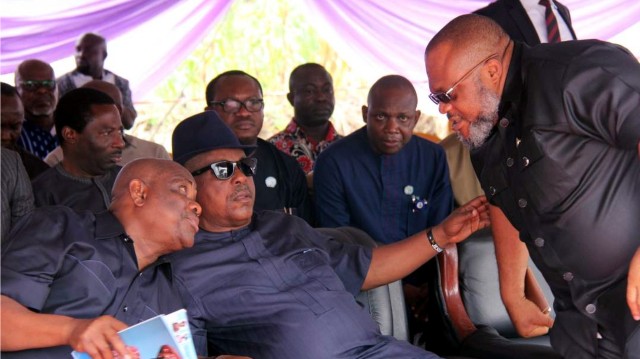Niger Delta
C’River Monarchs, Elders Laud Ayade’s Dev Strides

Prominent royal fathers and elders in Cross River State have applauded the State Governor, Prof. Ben Ayade, for what they described as giant strides recorded in the state in the last two years of his administration.
Making their commendations recently at a town hall meeting in Calabar, the state capital, the elders and chiefs maintained that after a critical assessment of the projects of the Governor, particularly the Calabar Garment Factory that has already employed over three thousand Cross Riverians, mostly women, Ayade would not have come at a better time than now.
According to them, projects conceived by Ayade’s administration are such that would transform the socio-economic landscape of the state.
Speaking on behalf of other paramount rulers from the 17 local government areas of the state, Paramount Ruler of Calabar Municipality, Ndidem Patrick Ika Oqua stated: “Everyone who follows the trend in the state will appreciate Governor Ayade’s effort especially his ability to sustain the payment of salaries from the inception of his administration to date. I think, Ayade deserves an applause for all these developmental strides.”
While appealing to the Federal Government to consider possible ways of compensating the state for the loss of Bakassi and consequently reallocating its 76 oil wells, the royal father pointed out that “Cross River cannot continue to bear the harsh impacts of an action that was caused by the Federal Government. Therefore, the state should be allowed the leeway to explore other sources of generating revenues.”
He particularly mentioned the activities of tank farms operators in Calabar who have refused to pay some levies for operating in the state.
Ika Oqua further noted: “The operators and indeed the Federal Government must explore possible ways of extending little benefits to the state to enable it maintain its critical infrastructure.”
Also speaking for the women in the state, a woman activist, Mrs. Grace Eyo-Ita, praised the governor for his untiring effort in luring investors to the state in just two years in office. She added that Ayade’s many trips have today been translated into concrete and visible projects on ground that will directly benefit the people.
Responding, Governor Ayade thanked the chiefs and elders in the state for the show of love and appreciation for the programmes and projects of his administration, explaining that, “I offered myself as a sacrificial lamb to lay solid foundation for a new Cross River that will be financially independent.
“I have an eight year agenda and the agenda is to put an end to Cross River State ever needing money from Abuja.
I am the one who will pay the price and lay the foundation for the next administration, I will gladly play that role.”
Lamenting his ordeal occasioned by lean resources to the state from the federation account, making execution of projects practically impossible, Ayade disclosed that “Cross River State is in captivity. A state that has been reduced to wants in body, spirit and soul,” disclosing that he was embarking on projects that would eventually decouple the state from relying on the federation account.
The Governor also disclosed that “Cross River State got just N4.2 billion cumulatively in the last quarter, in the face of a wage bill of over N5 billion monthly. That is the challenge I met and still tackling till now.
Friday Nwagbara, Calabar
Niger Delta
NPC Unveils Digital Registration System In Delta

Niger Delta
Police Uncover Suspects’ Armoury … Recover Weapons In Delta

Niger Delta
Police Caution On Lawless Protests On Court Matters In A’Ibom

-
Maritime3 days ago
Nigeria To Pilot Regional Fishing Vessels Register In Gulf Of Guinea —Oyetola
-

 Sports3 days ago
Sports3 days agoGombe-Gara Rejects Chelle $130,000 monthly salary
-
Maritime3 days ago
Customs Declares War Against Narcotics Baron At Idiroko Border
-
Maritime3 days ago
NIMASA,NAF Boost Unmanned Aerial Surveillance For Maritime Security
-

 Sports3 days ago
Sports3 days agoTEAM RIVERS SET TO WIN 4×400 ” MORROW” …Wins Triple jump Silver
-
Maritime3 days ago
NIWA Collaborates ICPC TO Strengthen Integrity, Revenue
-

 Sports3 days ago
Sports3 days agoNPFL Drops To 91st In Global League Rankings
-

 Sports3 days ago
Sports3 days agoNPFL Impose Fines On Kwara United Over Fans Misconduct

